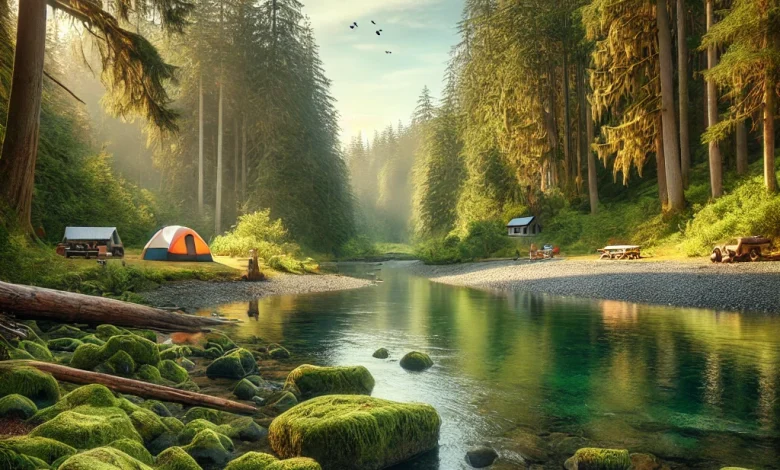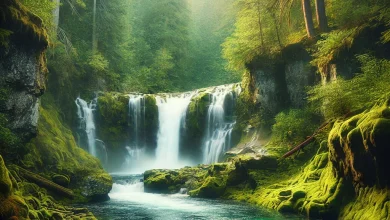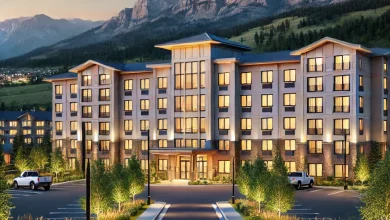Lyre River Campground: 7 Reasons to Plan Your Ultimate Sustainable Nature Escape

Table of Contents
Lyre River Campground: A Nature Lover’s Paradise
Nestled on the Olympic Peninsula in Washington State, Lyre River Campground is a hidden gem for outdoor enthusiasts seeking tranquility and adventure. Known for its lush surroundings and pristine natural beauty, this campground is a must-visit destination for anyone looking to reconnect with nature. With its ideal location near some of Washington’s most iconic attractions, Lyre River Campground offers a unique experience that combines serenity with easy access to outdoor activities. Whether you’re a seasoned camper or a first-time visitor, this campground promises an unforgettable retreat into the wild.
Location and Accessibility
Lyre River Campground is located just off the Strait of Juan de Fuca Highway (U.S. Route 101), near the northern edge of the Olympic Peninsula. This picturesque spot is approximately 25 miles west of Port Angeles, making it a convenient getaway for residents of western Washington and beyond. For travelers arriving by car, the campground is easily accessible via well-maintained roads. RVs and trailers are also welcome, as the site features parking accommodations for larger vehicles.
If you’re flying into the region, the nearest airport is William R. Fairchild International Airport in Port Angeles. From there, a short scenic drive takes you to the campground. With its clear signage and convenient location, Lyre River Campground is easy to find, even for first-time visitors.
Natural Surroundings and Scenery
The Lyre River itself is the centerpiece of the campground, flowing gently through a lush landscape of towering evergreens and vibrant moss-covered rocks. This serene river is not only a visual delight but also a vital part of the local ecosystem, supporting a diverse range of flora and fauna.
The surrounding forests are home to Douglas firs, western red cedars, and bigleaf maples, creating a verdant canopy that offers shade and beauty year-round. Wildlife enthusiasts will be thrilled by the opportunity to spot black-tailed deer, river otters, and a variety of bird species, including bald eagles and kingfishers.
For those looking to explore beyond the campground, nearby attractions include the majestic Lake Crescent, the stunning Marymere Falls, and the expansive Olympic National Park. Hiking trails, waterfalls, and coastal views are all within a short drive, making Lyre River Campground an ideal base for nature lovers.
Camping Facilities
Lyre River Campground offers a range of campsites to suit different preferences, including options for tent camping and RVs. Each site is thoughtfully designed to provide privacy and a sense of immersion in nature. Amenities include fire pits, picnic tables, and level pads for setting up tents or parking RVs.
Potable water is available on-site, ensuring campers have access to clean drinking water throughout their stay. While the campground does not offer power hookups, its rustic charm and basic facilities cater to those who appreciate a more traditional camping experience. Clean restrooms and trash disposal areas are also provided to ensure a comfortable stay for all visitors.
Activities and Adventures
Lyre River Campground is a hub for outdoor activities, offering something for everyone. Anglers will appreciate the opportunity to fish for salmon and trout in the Lyre River, especially during peak fishing seasons. The calm waters are also perfect for kayaking and canoeing.
Hiking enthusiasts can explore nearby trails, such as the Spruce Railroad Trail, which winds along the shores of Lake Crescent. Birdwatchers can bring their binoculars to spot a variety of species that inhabit the area, while photographers will find endless inspiration in the stunning landscapes.
Seasonal activities add another layer of excitement to a visit to Lyre River Campground. Autumn brings breathtaking fall foliage, while winter offers a quieter, more secluded experience. Spring and summer are ideal for wildflower viewing and enjoying the area’s mild weather. For those willing to venture further, a day trip to the Hoh Rainforest or Hurricane Ridge provides a deeper dive into the wonders of the Olympic Peninsula.
Best Times to Visit
The Lyre River Campground is a year-round destination, but the best time to visit depends on the kind of experience you’re looking for. Each season has its unique charm, making this campground a versatile getaway.
Summer (June to August)
Summer is the most popular season at Lyre River Campground. The warm temperatures, typically ranging from the mid-60s to low 80s (°F), create an inviting environment for camping, hiking, and water activities. Long daylight hours mean you can fully immerse yourself in outdoor adventures like fishing along the Lyre River, kayaking, or exploring nearby trails. Summer is also an ideal time for families, as school breaks make it convenient for group trips. However, because of the campground’s popularity during this season, campsites can fill up quickly. Advanced reservations are strongly recommended, especially for weekends and holidays.
Spring (March to May)
Spring at the Lyre River Campground offers a refreshing escape as nature awakens after winter. Temperatures during this season range from the high 40s to mid-60s (°F), making it cool but comfortable. The surrounding forests burst into life with blooming wildflowers like trilliums and salmonberry blossoms, while the sound of the rushing Lyre River adds to the serene ambiance. Spring is also a fantastic time for birdwatching as migratory species return to the area. Expect fewer crowds, which means you can enjoy the tranquility and natural beauty in peace. Be sure to pack rain gear, as spring showers are common in the Pacific Northwest.
Fall (September to November)
Fall is a magical time to visit Lyre River Campground, with temperatures ranging from the low 40s to mid-60s (°F). The surrounding forest transforms into a tapestry of gold, red, and orange as the leaves change color. It’s the perfect season for photographers, hikers, and anyone seeking a peaceful retreat. Fall is also the time to witness the salmon run, an extraordinary natural event where salmon return to the river to spawn. Fishing enthusiasts will find this season particularly rewarding. Like spring, fall offers fewer crowds, making it ideal for campers who prefer a quieter experience.
Winter (December to February)
For those who enjoy solitude and don’t mind cooler weather, winter at Lyre River Campground is a hidden treasure. Temperatures usually hover in the mid-30s to low 50s (°F), and though it’s the wettest season, the rainfall enhances the lush greenery and the flow of the Lyre River. Winter camping offers a unique opportunity to enjoy the quiet beauty of the Pacific Northwest without the crowds. This is a great time for those looking to unplug and reconnect with nature. Just be prepared for wet conditions, and pack appropriate clothing and gear to stay warm and dry.
Tips for Choosing the Best Time
Packing Smart: Each season brings its own challenges, so make sure to pack essentials like rain gear, warm clothing, and sturdy shoes depending on the time of year.
Avoiding Crowds: For a more private experience, visit during weekdays or shoulder seasons (spring and fall).
Weather Considerations: If you’re not a fan of rain, plan your trip during late summer when conditions are drier.
Special Events: Keep an eye out for seasonal highlights like spring wildflowers, fall salmon runs, or migratory bird activity.
Practical Information
Booking a site at Lyre River Campground is straightforward. Reservations can often be made online through local parks and recreation websites, or you can check availability by contacting the campground directly. As this is a popular spot, especially in summer, early planning is advised to secure your preferred campsite.
Visitors should familiarize themselves with the campground’s rules and regulations. Campfires are typically allowed but may be restricted during dry seasons to prevent wildfires. Pets are welcome but must be kept on a leash to protect local wildlife. Packing essentials such as insect repellent, sturdy footwear, and warm clothing will ensure a comfortable and enjoyable stay.
Personal Experiences or Reviews
Campers who have stayed at Lyre River Campground often rave about its serene atmosphere and well-maintained facilities. One visitor described waking up to the sound of the river as a highlight of their trip, while another praised the campground’s proximity to Olympic National Park and other attractions.
Families, solo travelers, and groups of friends alike have shared stories of memorable fishing trips, wildlife encounters, and evenings spent around the campfire. The blend of convenience and natural beauty makes Lyre River Campground a standout destination for both seasoned campers and newcomers to the outdoor experience.
Sustainability and Respect for Nature
Preserving the natural beauty of Lyre River Campground is not only a responsibility but also a privilege that allows visitors to contribute to the longevity of this serene environment. Nestled in the lush surroundings of the Olympic Peninsula, this area thrives due to the combined efforts of campers and conservationists who prioritize sustainability and respect for nature. By adhering to environmentally friendly practices, visitors can enjoy their time while ensuring the campground remains pristine for future generations.
Follow Leave No Trace Principles
The Leave No Trace principles are a cornerstone of sustainable camping. These seven guidelines provide a framework for minimizing your environmental impact:
- Plan Ahead and Prepare: Research weather conditions, trail maps, and regulations specific to Lyre River Campground. Being prepared helps avoid accidents and minimizes the need for unnecessary resource usage.
- Travel and Camp on Durable Surfaces: Use designated campsites and trails to avoid damaging fragile plant life or causing soil erosion.
- Dispose of Waste Properly: Always pack out what you bring in, including food scraps, wrappers, and biodegradable waste. Use provided trash receptacles or take trash home if bins are full.
- Leave What You Find: Rocks, plants, and historical artifacts are best left undisturbed to preserve the area’s natural and cultural heritage.
- Minimize Campfire Impact: Use designated fire pits, keep fires small, and ensure they are fully extinguished before leaving. Consider using a portable camp stove for cooking instead of building a fire.
- Respect Wildlife: Observe animals from a safe distance, never feed them, and store food in secure containers to avoid attracting curious wildlife.
- Be Considerate of Others: Keep noise levels down, respect other campers’ space, and yield the trail to hikers or wildlife when necessary.
Protecting Wildlife and Flora
The campground is home to diverse wildlife, including birds, deer, and occasionally black bears. Feeding wildlife disrupts their natural behaviors and can make them reliant on humans, which often leads to dangerous encounters. Campers should store food securely in bear-proof containers or their vehicles to prevent attracting animals.
The forest surrounding Lyre River Campground boasts old-growth trees, ferns, and wildflowers. To protect these ecosystems, visitors should avoid trampling plants or disturbing nesting sites. Staying on marked trails is crucial to preserving the undergrowth and preventing erosion.
Water Conservation and Protection
The Lyre River is a vital resource for the local ecosystem and a highlight of the campground. Visitors should take care not to pollute the river by refraining from using soaps, shampoos, or other chemicals in or near the water. Fishing enthusiasts are encouraged to practice catch-and-release or follow local guidelines to ensure fish populations remain sustainable.
Using Fire Responsibly
Campfires are an essential part of camping, but they also pose significant risks if not handled properly. Fires should only be built in designated fire rings, and campers must adhere to local fire regulations, especially during dry seasons when bans may be in place. Avoid burning trash or non-organic materials, as they release harmful toxins into the air. Always ensure that your fire is completely out before leaving it unattended.
Engaging in Local Conservation Efforts
Visitors can support sustainability efforts by participating in local clean-up events or donating to organizations that work to preserve the Olympic Peninsula. Volunteering to help maintain trails or report any issues, such as fallen trees or signs of pollution, can make a significant difference in keeping the campground in excellent condition.
Educational Opportunities
The campground and surrounding areas offer opportunities to learn about sustainable practices and the local environment. Guided nature tours, workshops, or information boards (if available) provide insights into the area’s unique ecosystem and how visitors can help protect it.
A Collective Responsibility
By taking simple but mindful steps, campers can protect the fragile ecosystems of Lyre River Campground. Sustainable practices not only enhance the camping experience but also ensure that future generations can marvel at the same natural beauty that draws visitors today. Whether it’s extinguishing a fire completely, picking up trash, or respecting wildlife, every small action contributes to the preservation of this tranquil haven.
Conclusion
Lyre River Campground is more than just a camping destination; it’s a gateway to the pristine wilderness of the Olympic Peninsula, offering visitors a chance to immerse themselves in nature’s tranquility. Whether you’re fishing along the serene Lyre River, exploring nearby hiking trails, or simply enjoying the peace and quiet under a canopy of towering evergreens, this campground offers something for everyone.
Its convenient location, well-maintained facilities, and close proximity to iconic attractions like Lake Crescent and Olympic National Park make it an ideal base for exploring the region. By following sustainable practices and respecting the environment, campers can ensure that the beauty of Lyre River Campground remains intact for future generations. Plan your visit today and discover why this hidden gem is a favorite among nature lovers.
Frequently Asked Questions
1. Where is Lyre River Campground located?
Lyre River Campground is located on the northern edge of the Olympic Peninsula in Washington State, approximately 25 miles west of Port Angeles. It is easily accessible via the Strait of Juan de Fuca Highway (U.S. Route 101).
2. What amenities are available at Lyre River Campground?
The campground offers fire pits, picnic tables, level pads for tents or RVs, potable water, and clean restrooms. However, power hookups are not available, making it a more rustic camping experience.
3. Can I bring my RV to Lyre River Campground?
Yes, RVs and trailers are welcome at Lyre River Campground. The site provides parking accommodations for larger vehicles, though it’s always a good idea to check ahead for specific size restrictions.
4. What activities can I enjoy at Lyre River Campground?
Popular activities include fishing, hiking, birdwatching, kayaking, and photography. Seasonal highlights include the salmon run in fall, wildflower blooms in spring, and snow-covered serenity in winter.
5. When is the best time to visit Lyre River Campground?
Summer is the most popular season due to warm weather and long daylight hours, but spring and fall offer fewer crowds and unique seasonal attractions like blooming wildflowers and colorful foliage. Winter is ideal for those seeking solitude and a peaceful escape.
6. Is Lyre River Campground pet-friendly?
Yes, pets are allowed at Lyre River Campground. However, they must be kept on a leash at all times to protect local wildlife and other campers.
7. Do I need a reservation to camp at Lyre River Campground?
While reservations are not always required, they are highly recommended during peak seasons, such as summer and holiday weekends, to ensure you secure a spot.
8. Are there any nearby attractions worth visiting?
Absolutely! Lyre River Campground is close to several iconic destinations, including Lake Crescent, Marymere Falls, Hurricane Ridge, and the Hoh Rainforest in Olympic National Park.
9. Are there rules for campfires at Lyre River Campground?
Campfires are allowed in designated fire pits, but campers must adhere to local fire regulations, especially during dry seasons when fire bans may be in place. Always ensure your fire is completely extinguished before leaving it unattended.
10. What should I pack for my visit to Lyre River Campground?
Essential items include rain gear, warm clothing (especially for spring, fall, and winter), insect repellent, sturdy hiking shoes, and camping supplies like a tent, sleeping bag, and cooking equipment. Don’t forget to bring trash bags to pack out all waste.
You May Also Read



